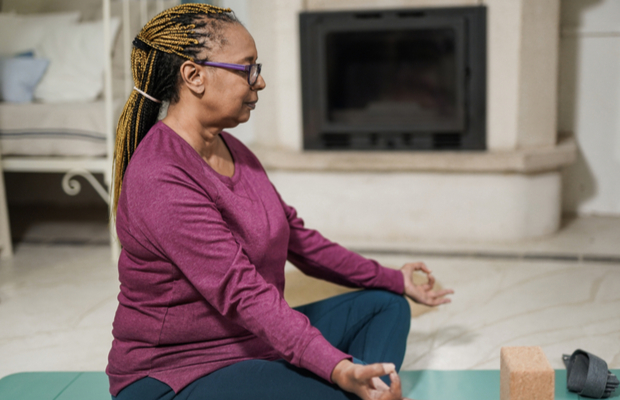1. Talk to someone

One of the most important ways to improve your mental health if you are feeling low is to talk to someone about how you’re feeling, Professor Kate Bennett, Professor of Psychology at the University of Liverpool, says: “A trouble shared is a trouble halved.” One reader, David Chappell, from Brighton, suggests: “Picking up the phone and sharing what you're going through.” If starting a conversation about feeling low is difficult, then Professor Bennett suggests bringing it up in the course of another conversation, for example with a neighbour, relative or GP.
Helplines can be useful, especially if you find it easier to confide in someone you don’t know. The Samaritans have a 24-hour helpline (call 116 123) staffed by trained volunteers who will listen and help you talk through your worries. You can also speak to other people with heart and circulatory problems on the BHF online community, or see if there’s a Heart Support Group near you.
Want to get fit and healthy?
Sign up to our fortnightly Heart Matters newsletter to receive healthy recipes, new activity ideas, and expert tips for managing your health. Joining is free and takes two minutes.
I’d like to sign up
2.Get outside

When you're stressed you might feel less motivated to exercise or get outside. But research has suggested that spending at least two hours a week in nature is associated with better health and wellbeing, and can boost your mood. Professor Bennett adds that exercising when you can, eating well and good sleep habits all help you feel better.
3. Positive self-talk
People who cope well in turbulent times often have higher self-esteem, Professor Bennett explains. “Recognising your value doesn’t have to be anything grand, just have a think about things you’ve done that have been successful or worked well for you before.”
For example, it might help to think about how you've overcome challenging situations in the past. These simple approaches can help build confidence and resilience, and help you feel more positive about your ability to deal with uncertainty.
4. Build your resilience

During turbulent times, it is normal and understandable to feel anxious and overwhelmed. But how we manage those feelings can make all the difference.
There are certain thinking patterns that help people feel more resilient, Professor Bennett says. For example, thinking about what you have and why you are grateful for it.
When we hear about concerning headlines or some other unwelcome news, it’s tempting to focus on the negative. If we pause to reflect, however, we can often find something to be grateful for. Try writing those things down, as there’s evidence that keeping a gratitude journal positively affects wellbeing.
For instance, many people are worried about how to stay healthy and well during the ongoing cost of living crisis. While this is a very real problem which gratitude won’t change, we might feel calmer and more resilient if we stop and give thanks for our loved ones, our last meal, our access to clean water, and much more.
About the expert
Professor Kate Bennett, Professor of Psychology at the University of Liverpool, has been working with a team of experts to look at the impact of Covid-19 on mental health in the UK. Her research has also focused on later life, resilience, bereavement, long-term conditions, nutrition and wellbeing.
Are you feeling worried about rising living costs?
